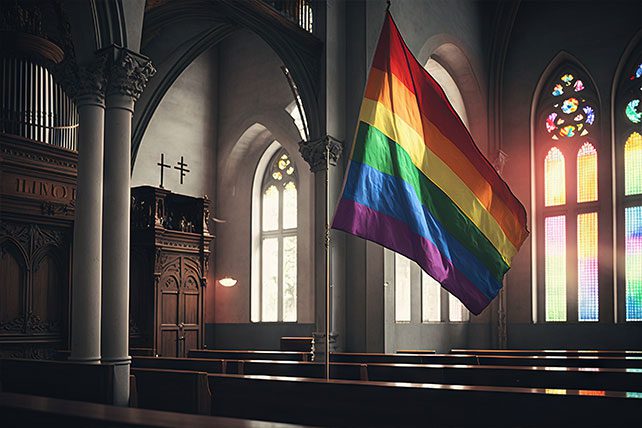In the final day of the United Methodist Church’s Special Session of the General Conference, the denomination voted to take an official stance on homosexuality. After decades of ambiguity, the UMC’s General Conference has voted to hold a traditional approach to marriage and ordaining clergy. Moving forward, the UMC will not allow same-sex weddings, nor will it ordain LGBTQ+ clergy.
“We do not want to force any church to leave the denomination,” Beth Ann Cook told a raucous crowd after the final vote was settled.
Despite the bishops’ attempt to address the elephant in the room graciously, the backlash from those opposed to the Traditional Plan made it clear that this vote will cause many churches (particularly in the U.S.) and LGBTQ+ clergy members to leave the denomination.
While most delegates from the Central Conference of the UMC, which represents churches in Africa, Europe and Asia, rejoiced over the decision, the general feeling of the delegates from the U.S. was one of dismay.
The Central Conferences are celebrating on the floor. #gc2019
— Pooteetweet304 (@pooteetweet304) February 26, 2019
United Methodist Church Homosexuality Question Settled
A motion to substitute the One Church Plan for the Traditional Plan was defeated early in the day by a vote of 449 against and 374 in favor. Later, less than two hours before the General Conference was scheduled to adjourn, delegates voted on and passed the Traditional Plan by a vote of 438 for and 384 against.
The Judicial Council of the Church deemed several components of the Traditional Plan unconstitutional. While the day was intended to be spent making adjustments to the plan to make it constitutional, the amendments, motions and discussions brought forward by the delegates digressed into impassioned speeches for and against the Traditional Plan. According to United Methodist News, the Judicial Council will address the parts deemed unconstitutional at its next scheduled meeting April 23-25 in Evanston, Illinois.
The moderators of the discussion had a monumental job in keeping delegates on task and following the rules of conferencing. Over 35,000 people tuned in to the general conference via livestream, speaking to the gravity of the vote.
The Traditional Plan is favored by those in the church who wish to maintain a traditional view of marriage as being between one man and one woman. It also tightens restrictions on homosexuals who wish to serve as clergy members. Others that leaned toward allowing the church to perform same-sex weddings and ordaining openly homosexual clergy were in favor of the One Church Plan, which would allow individual churches to decide where they land on the issue of homosexual marriage and LGBTQ+ clergy.
Major Arguments for the One Church Plan
Those in favor of the One Church Plan, such as Reverend Thomas Berlin, admonished delegates from the Central Conference to vote for the plan because it would not require them to change their practices but it would allow churches in the U.S. to be inclusive of LGBTQ+ people. Berlin called the Traditional Plan a “virus” that would make the American church “sick.”
Several young people gathered around a microphone with delegate Shayla Jordan about halfway through the day. Jordan gave the case for the One Church Plan, saying the majority of young people in the UMC supported it. She appealed to the older generations to think about the young people who would leave the church over a decision for the Traditional Plan. Jordan said there was a petition with over 15,000 signatures of young people who support the One Church Plan.
Reverend Adam Hamilton accused the more conservative Wesleyan Covenant Association (WCA) of trying to push centrists and progressives out of the UMC. Hamilton said he was tired of hearing people say, “The Bible says it. I believe it,” without considering that some people who revere and study Scripture as much as they do interpret it differently. He also pointed out what he believes is hypocrisy in circles such as the WCA who read the passages of Paul which instruct women to keep silent, to submit, to not wear jewelry, etc. and disregard those instructions due to their cultural context, yet don’t do the same when Paul talks about same-sex acts in the New Testament.
Hamilton then made a remark about the fact that the conference spent the better part of a day discussing pensions for clergy members when the Bible speaks repeatedly about not “laying up for oneself treasures on the earth.” Delegate Emanuel Cleaver made a similar statement when he said the conference was overlooking so many more pressing issues such as lack of women in leadership and lack of representation by African Americans in the denomination. “If we’re going to get biblical, let’s get real biblical,” Cleaver said. He argued that while the Bible only mentions homosexuality a handful of times, it spends much more time addressing issues of injustice and poverty.

